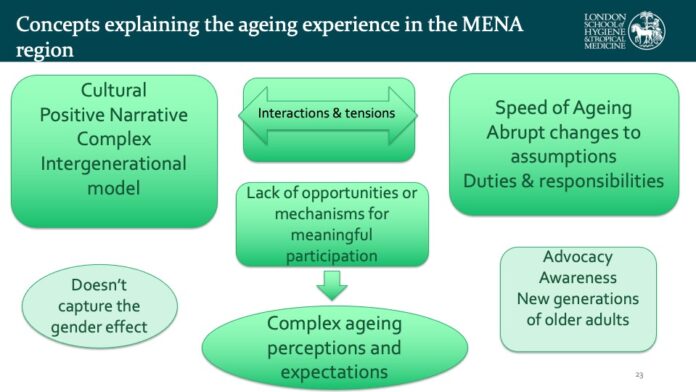Introduction:
The Middle East and North Africa (MENA) region, traditionally characterised by youthful demographics, is rapidly transforming into ageing societies. Despite strong cultural narratives of respect towards the elderly, these ideals often clash with the lived experiences of older individuals. In this engaging blog, we delve into the intersectionality of gender and ageing perception in the MENA region, drawing on qualitative data collected as part of the Middle East and North Africa Research on Ageing Healthy (MENARAH) Network engagement activities between 2020 and 2022.
Understanding the Region:
The MENA region, spanning diverse countries with varying income levels and socio-political landscapes, shares unique ageing features. The fast-paced transition towards ageing populations necessitates a paradigm shift in the perception of ageing, encompassing expectations and opportunities for older individuals.
Challenges and Opportunities:
While many countries in the region are in the early stages of population ageing, the pace is notably swift. With a ‘youth bulge’ and high fertility rates, the optimal utilization of the working-age population faces challenges, including low labour force participation rates, informal work arrangements, and economic disparities. Despite common cultural values emphasizing respect for older people, societal systems often place the responsibility of care on families, limiting broader policy interventions.
The Impact of COVID-19:
The COVID-19 pandemic and associated restrictions have significantly impacted the lives of older people globally, including in the MENA region. The reliance on family support and the elimination of pre-pandemic engagement opportunities have accelerated physical and psychological deterioration among older individuals, especially those aged 80 or more.
Cultural Narratives and Gender Dynamics:
Cultural norms surrounding ageing in the MENA region are deeply rooted in Islamic and Christian religious codes, prescribing intergenerational care and duty roles. While older people are theoretically held in high regard, practical applications often fall short, leading to social isolation and limited social participation opportunities. Gender dynamics further complicate perceptions, with older women being disproportionately perceived as vulnerable and dependent.
The Need for Advocacy and Awareness:
As the region undergoes significant demographic and societal changes, there is an urgent need for advocacy and awareness to challenge existing paradigms framing older people within a dependency context. This blog emphasizes the importance of including gender in conceptualising ageing perceptions, encouraging older individuals to develop autonomy and voice within a human rights framework.
Conclusion:
Navigating ageing in the MENA region involves understanding the complex interplay of cultural norms, gender dynamics, and the impact of global events like the COVID-19 pandemic. By shedding light on these intersections, we pave the way for meaningful advocacy, policy engagement, and a redefinition of ageing perceptions, empowering older individuals to embrace autonomy and voice in the face of demographic and societal changes.
The findings of this work are published in a recent article and were presented at a regional event organised by CREAD.
Watch the whole event.
Access the presentation:
SHussein-Oct22Founder and Director
Shereen Husseinis a Health and Social Care Policy professor at the London School of Hygiene and Tropical Medicine (LSHTM), United Kingdom.
Shereen Founded the MENARAH Network in 2019, through an initial grant from the Global Challenge Research Fund, UKRI. She is a medical demographer with expertise in ageing, family dynamics, migration and long-term care systems. Shereen regularly collaborates with the United Nations, the World Health Organisation and the World Bank in policy and research focused on ageing in the Middle East and North Africa Region.
Shereen received her undergraduate degree in statistics and a postgraduate degree in computer science at Cairo University. She completed an MSc in medical demography at the London School of Hygiene and a PhD in quantitative demography and population studies at the London School of Economics and Political Science, United Kingdom.






